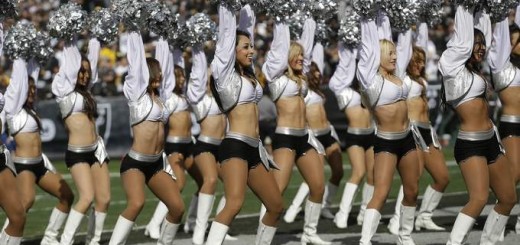You may have never heard of Rep. Jason Chaffetz (R) of Utah. If you have heard of him, then you likely know his general stance on taxes.
I have heard of him…in fact, I met him once in Washington, D.C. And I can tell you from personal experience, a more ardent supporter of the anti-tax Tea Party movement there is not.
But Chaffetz’s general stance on taxes did not stop him from recently introducing H.R. 3965, a bill which would revoke the tax exempt status of all professional sports organizations, including the National Football League, National Hockey League, and the Professional Golfers Association. Of the four major sports leagues in the United States, only the NFL and the NHL are currently tax exempt entities under Section 501(c)(6) of the Internal Revenue Code (IRC). The NBA has never had a tax exemption, and Major League Baseball voluntarily gave up its tax-exempt status in 2007 because of provisions in the tax code which required disclosure of executive salaries for such entities (of course, that hasn’t stopped us from knowing that Bud Selig made $22 million in each of the past two years).
Chaffetz is not the first to call for the revocation of the NFL’s tax exempt status. His bill piggybacks on S. 1524, a bill introduced in the Senate by Thomas Cogburn (R) of Oklahoma in September 2013.
And support for revocation of the NFL’s tax exempt status doesn’t end there.
Lynda Woolard, a diehard Saints fan from New Orleans, started a Change.org petition last year which calls on members of Congress to revoke the NFL’s tax exempt status. The petition has garnered more than 356,000 signatures. Woolward also co-founded SackNFLTaxBreaks.org, a self-described “national grassroots advocacy campaign” which was launched on the eve of Super Bowl XLVIII and seeks to “sack”, among other things, the NFL’s tax-free status.
Does the NFL fit the mold of a traditional tax-exempt non-profit entity? That’s certainly a debatable point. But under the current version of the Internal Revenue Code, there’s really no debate that it does qualify as a 501(c)(6) organization.
Internal Revenue Code, Section 501(c)(6)
Section 501(c)(6) of the IRC exempts from taxation “[b]usiness leagues, chambers of commerce, real-estate boards, boards of trade, or professional football leagues…not organized for profit and no part of the net earnings of which inures to the benefit of any private shareholder or individual.”
Critics argue that the inclusion of “professional football leagues” in Section 501(c)(6) constitutes a loophole in the tax code that unfairly grants tax-exempt status to the NFL when it otherwise would not qualify as a 501(c)(6). The term “professional football league” was added to the IRC in 1966 when the NFL and AFL merged. At that time, the merging leagues had already lobbied Congress for an antitrust exemption, and they took it a step further by convincing Congress to include professional sports leagues in the group of entitites that would be tax-exempt under 501(c)(6).
Now, to be fair, only the NFL’s and NHL’s league offices enjoy tax exempt status. The 32 NFL franchises and 30 NHL franchises each pay taxes on the revenue they receive. But maintaining their tax exempt status has become an increasingly hard sell for the leagues. Critics argue that both the NFL and NHL are actually for-profit corporations that do not resemble the business leagues, trade associations, and chambers of commerce that traditionally fall within the scope of Section 501(c)(6). Many point to the fact that the NFL earns about $9 billion per year and pays Commissioner Roger Goodell an annual salary of nearly $30 million as evidence that the NFL has no business maintaining its status as a non-profit entity.
In Favor of a Tax Exemption
Jeremy Spector, the NFL’s outside tax attorney, argues that every bit of that $9 billion revenue is subject to tax because, as mentioned above, the NFL’s profits are taxed at the team level. According to Spector, the NFL is a trade association[1] for the 32 individual franchises. And similar to other trade associations, the NFL league office “establishes rules and standard practices for its members, develops programs to help them run their operations more efficiently and profitably, and promotes the business in the broader community.”
To accomplish these worthy goals, the NFL league office receives funding in the form of dues paid by its 32 members clubs. These dues cover, among other things, overhead activities such as rent, league office salaries, and game officiating.
And to demonstrate that the NFL’s tax exemption must continue because that’s just how it’s always been, Spector points out that the IRS determined in 1942 that the NFL league office qualified as a tax-exempt trade association, long before the phrase “professional football leagues” was added to section 501(c)(6) in 1966. Spector argues that the phrase was only added to ensure that football players would continue to receive their pensions from the newly merged NFL without jeopardizing its tax exempt status.
Other experts who argue in favor of the league’s tax-exempt status point to the fact that, in 2011, the NFL league office did not make a profit because its expenses ($332.9 million) exceeded its revenue ($255.3 million).
Benefiting the Whole Industry?
But the fact that the NFL league office did not make a profit last year does not mean that it qualifies as a 501(c)(6) organization.
Regulation 1.501(c)(6)-1 of the Code of Federal Regulations (CFR) says that an organization whose purpose is to engage in a regular business of a kind ordinarily carried on for profit is not protected from taxes by IRC 501(c)(6). Additional rulings by the IRS make clear that the nature of a given business activity determines whether an organization engaged in business activity prohibited by IRC 501(c)(6), not whether the organization actually made a profit.[2] Thus, the fact that the NFL league office did not make a profit does not have a bearing on whether it qualifies as a 501(c)(6). Rather, the question is whether or not the NFL league office engages in business activity of a kind that is ordinarily carried on for profit.
Furthermore, Jeffrey Tenenbaum, a D.C. based tax attorney who specializes in nonprofit organizations, says that Section 501(c)(6) exempts from taxation only organizations whose primary purpose is to further the industry or profession they represent. To qualify as a 501(c)(6) organization, he says, anyone who meets the organization’s requirements or who is part of the industry must be allowed to join as a member.
To illustrate, under CFR 1.501(c)(6)-1 the purpose of a business league/trade association is not to perform particular services for individual persons or members, but rather to promote the common business interest of one of more “lines of business”. A “line of business” is a trade or occupation, entry into which is not restricted by any means that allows private parties to restrict the right to engage in the business.[3]
To this end, the IRS has denied tax-exempt status for organizations that restrict membership to dealers of a particular product, that benefit only its members instead of the industry as a whole, and that do not benefit people or companies who produce competing products.[4] Similarly, an organization which advertises only products produced by its members rather than generally advertising to encourage the use of products within the industry as a whole (think an ad for American Dairy milk vs. a “Got Milk?” ad) does not qualify as a 501(c)(6).[5]
A classic example of a 501(c)(6) sports organization, suggests Tenenbaum, is the US Tennis Association (USTA). The USTA, as opposed to the NFL, allows anyone to join as a member and promotes tennis at all ages, not just at the high-profile professional event level. It is a more traditional example of a 501(c)(6) organization because it promotes the entire tennis industry.
When comparing the practices of the NFL league office to those of the USTA, it’s difficult to argue that the NFL fits with this traditional definition of a tax-exempt trade association. The NFL tightly restricts its members to specific clubs (currently 32), whereas the USTA has unlimited membership and allows anyone to join. The UTSA promotes the entire tennis industry, whereas the NFL league office only promotes and advertises for a specific section of the football industry (i.e. the National Football League).[6]
An Act of Congress
As it stands right now under the current Internal Revenue Code, the NFL league office clearly qualifies as a 501(c)(6), since, you know, section 501(c)(6) pretty blatantly says “professional football leagues” and was written in 1966 with the intent of including the NFL.
But if Chaffetz’s and Cogburn’s bill passes, the argument about whether the NFL qualifies as a 501(c)(6) trade association would be moot. H.R. 3965 and S. 1524 would amend the Internal Revenue Code by adding a provision which removes from the scope of 501(c)(6) any professional sports organization that grosses more than $10 million in a year whose purpose is to foster national or international professional sports competitions. Fostering such competition includes managing league business affairs, providing referees, coordinating schedules, managing sponsorships or broadcast sales, operating loan programs for competition facilities, or overseeing player conduct.
Sounds like Roger Goodell’s job description to me…
In the end, it would take an Act of Congress to revoke the NFL’s (and NHL’s) tax exempt status. But if the members of Congress take a hard look at whether the NFL and NHL really are traditional trade associations, the passage of such an act may come down to whether Congress believes the leagues actually seek to benefit the entire industry to which they belong. If that’s the case, then the NFL’s tax-exempt status may be in jeopardy…unless, of course, the league’s high-paid lobbyists get to the Congress first.
[1] A trade association is included as a type of business league under IRC Section 501(c)(6). See http://www.irs.gov/Charities-&-Non-Profits/Other-Non-Profits/Business-Leagues.
[2] See Rev. Rul. 81-174, 1981-1 C.B. 335; Rev. Rul. 81-175, 1981-1 C.B. 337.
[3] Reilly, John Francis, et al. IRC 501(c)(6) Organizations, available at http://www.irs.gov/pub/irs-tege/eotopick03.pdf.
[4] See e.g. Rev. Rul. 69-106, 1969-1 C.B. 153; Rev. Rul. 67-77, 1967-1 C.B. 138; Rev. Rul. 58-294, 1958-1 C.B. 244.
[5] See e.g. Rev. Rul. 64-315, 1964-2 C.B. 147.
[6] And yes, it has been pointed out to me that the NFL works to promote youth football through NFL Play60 and a partnership with Pop Warner football. But the difference with the UTSA is that promotion of tennis to youth occurs within the UTSA itself and appears to be one of the UTSA’s central purposes. On the other hand, the promotion of football to youth occurs through organizations that are merely affiliated with the NFL league office, and the NFL league office’s primary purpose is promotion of the league itself.



I don’t find the Chaffetz/Coburn positions on professional sports league’s 501(c)(6)tax exemptions to necessarily be in conflict with their other tax positions. That’s not to say I necessarily agree with those positions, just that they’re not altogether inconsistent.
Also, you seem to take the position that sports leagues like the USTA deserve 501(c)(6) status because of their business model that fosters support for the sport at the league office level, rather than outsourcing the support to the for-profit teams assocaiated with the league office. Would the proposed legislation effectively revoke 501(c)(6) status for organizations like USTA? If the line of demarcation is $10m gross/year (rather, than say, the business model of how the league actually fosters support) it might undercut leagues that have a wide base (and thus large gross revenues) that actually do the kind of work a 501(c)(6) is designed to do.
Dallin, thanks for the comment. I think that’s a fair assessment of Chaffetz and Coburn’s positions, and I’ll defer to you on that since I know you spend much more time with congresspeople than I do.
Regarding your second comment about the USTA’s tax-exempt status, I think that’s definitely a possibility considering the ambiguous language of both H.R. 3965 and S. 1524: http://beta.congress.gov/bill/113th-congress/house-bill/3965/text. The bills stipulate that an organization will not be treated as a 501(c)(6) entity if it is “a professional sports league, organization, or association, a substantial activity of which is to foster national or international professional sports competitions.” I think the key in that provision is the word “professional.”
The USTA runs the U.S. Open, which is obviously a substantial professional competition, and I believe 2 or 3 other professional tournaments. However, the USTA clearly is much more directly involved in amateur events at the youth, collegiate, and adult levels than is the NFL’s league office, so it would be interesting to see whether the IRS believes that running such professional tournaments would constitute a “substantial activity” for the USTA.
For what it’s worth, I’m not sure whether Chaffetz or Coburn’s intent is that the USTA be included in the scope of organizations that lose their tax-exempt status. On one hand, it’s clear that their focus is huge cash cows like NFL and NHL. On the other hand, Coburn himself has recognized that his bill would revoke the tax exemption for organizations like the PGA Tour and the Professional Rodeo Cowboys Association: http://www.usnews.com/opinion/articles/2013/11/30/the-nfl-doesnt-need-tax-exempt-status.
I don’t know how much the PGA Tour and the Professional Rodeo Cowboys Association do to promote their individual sports at the non-professional level, but the “Professional” in their title provides at least one apparent difference between them and the USTA.